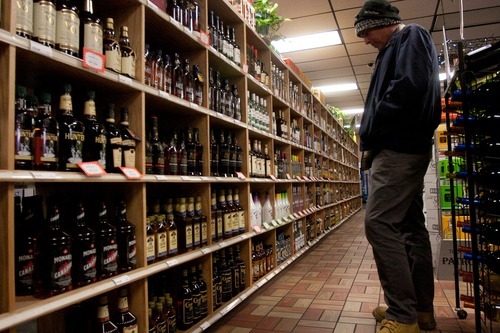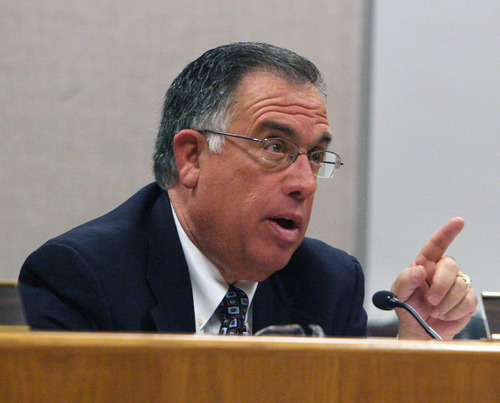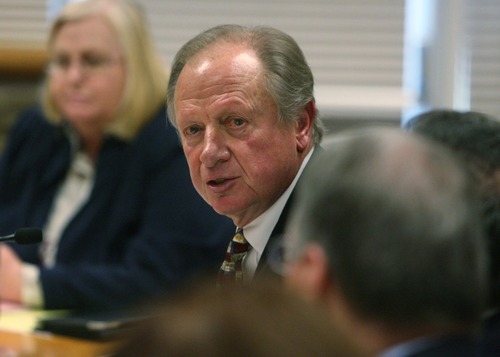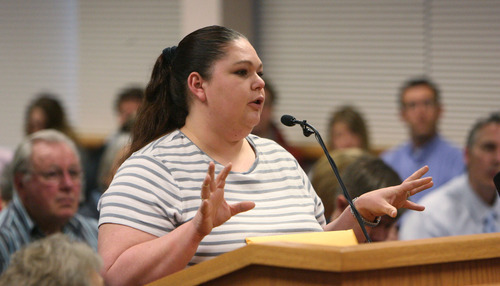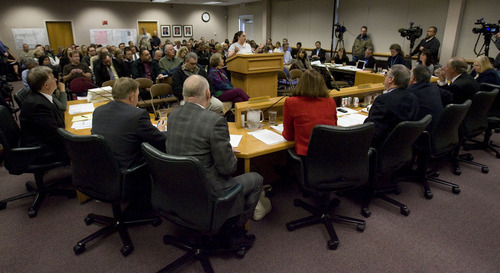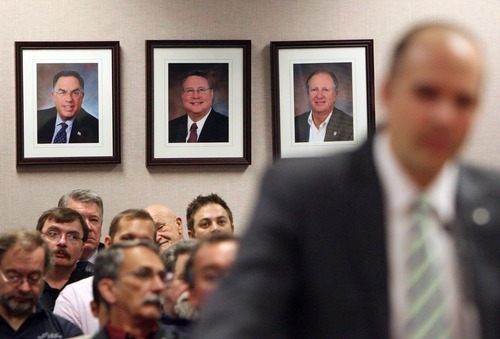This is an archived article that was published on sltrib.com in 2011, and information in the article may be outdated. It is provided only for personal research purposes and may not be reprinted.
The state liquor-control board rebuked the Legislature on two fronts Thursday, criticizing efforts to close profitable liquor stores and, in a unanimous vote, asking Gov. Gary Herbert to veto alcohol-reform legislation they say could spawn abuses.
SB314, sponsored by Sen. John Valentine, R-Orem, would allow existing liquor licenses to be sold to the highest bidder; the commission chairman to be appointed annually by the governor; and the commission to engage in closed meetings.
Sam Granato, chairman of the Alcoholic Beverage Control Commission, has repeatedly said meetings will remain open under his leadership. His term ends in June, and it's widely believed he won't be reappointed.
Commissioner Gordon Strachan said at the panel's crowded meeting Thursday that allowing the governor to appoint the chairman, instead of continuing the practice of being elected by the board, would be fraught with the potential for abuse and corruption. The appointment would also be subject to Senate approval, allowing for even more political pressure. Strachan, whose term also ends in June, said "politics and liquor don't mix."
The governor's spokeswoman, Ally Isom, said Herbert wouldn't make a public statement on SB314 "until he takes action on the bill."
The commission's stunning 4-0 vote (with one member absent) was the first such appeal to a governor in memory. It was cast by two board members appointed by then-Gov. Jon Huntsman Jr., known for his attempts to liberalize state liquor laws in the name of economic development, and two named by his successor, Herbert, who has been quiet on the issue.
Herbert's commission appointees, Kathleen Collinwood and Richard Sperry, said their concerns outweighed their initial reluctance in asking for the veto.
The sticking point for Sperry in Valentine's bill is allowing owners of restaurants and bars to sell liquor licenses to the highest bidder.
"I struggled," said Sperry, whose term ends in 2013. "But if licenses can be sold, it opens the potential for discrimination against small-business and mom-and-pop operations to be priced out of the market. And there could be pressure or undue influence on other small owners to sell."
But Valentine said Thursday that transferring licenses wouldn't go into effect until July 2012 — a concession he made that would give commissioners time to confer with lawmakers on adjustments.
"This would not go into effect until after the next legislative session, so I call on the commission to work with us," Valentine said. "I am agitated. Candidly, these are things I've made concessions on, and now they're saying I don't understand this issue."
But Collinwood, whose term ends in 2014, said that once the bill incorporated provisions to sell licenses, "it takes on a life of its own. I'm not certain anyone could get it fixed."
The other big topic at Thursday's meeting was the closing of state-run liquor stores and smaller, privately run package agencies.
The board added three alcohol outlets to a list of locations that could be shuttered as part of budget cuts ordered by the Legislature.
Along with nine outlets in four counties already on a potential hit list, the Salt Lake City Avenues liquor store at 402 E. Sixth Ave., the outlet in Roy and the Midvale package agency have been added.
Granato said he was saddened that state lawmakers had put the liquor board in a position to close profitable stores. He characterized the action as an unwise business decision.
City officials and members of the public who packed the meeting asked that stores in their communities and neighborhoods be spared.
Provo Deputy Mayor Corey Norman said the only liquor store in the state's third-largest city shouldn't be closed.
"Liquor is important to Provo," Norman said. "This is an economic-development issue."
The Provo store has annual sales of $5.9 million and brings in tax revenue to state and local treasuries totaling $2.6 million.
Norman also questioned the wisdom of closing a store when its bonds won't be paid off until 2025.
"Why pay on a bond for a store that is sitting idle?" he asked.
Last fall, legislative auditors singled out liquor stores in Provo and Orem that could be closed because both cities are within a few miles of larger regional outlets in neighboring municipalities. Lawmakers have repeatedly used that report as a reason to slash the liquor department's budget during the next fiscal year, starting in July, by $2.2 million.
Midvale Mayor JoAnn Seghini again appeared before the commission to argue that the small store anchoring her city's historic district should remain open. At the close of the legislative session, lawmakers allocated $257,000 to keep open so-called package agencies after rural mayors protested closing outlets in their communities.
But the action might not be enough to save all of them. Agencies in Springville and Spanish Fork are also now targeted for closure.
One state-run store already on the hit list is the Salt Lake City outlet at 1457 S. Main St., which is set to be closed April 1.
Commissioners are scheduled to make a final decision next month on other closures.
- —
Liquor stores on Legislature's hit list
Stores added Thursday:
Roy • 5948 S. 1900 West, $4.4 million annual sales.
Salt Lake City• 402 E. 6th Ave., $4 million sales.
Midvale • 7598 S. Main St., $516,000 annual sales.
Store already on the hit list:
Salt Lake City » 1457 S. Main St., $3 million sales.
Salt Lake City » 1615 Foothill Blvd., $3.7 million sales.
South Salt Lake » 63 E. Miller Ave., $2.5 million sales.
Orem » 1688 N. State St., $3.7 million sales.
Provo » 166 S. Freedom Ave., $5.9 million sales.
Park City » 460 Swede Alley, $1.3 million sales.
St. George » 929 W. Sunset, $2.7 million sales;.
Spanish Fork » 51 W. 100 North, $606,000 sales.
Springville » 685 S. Main St., $790,000 sales.
Source: Utah Department of Alcoholic Beverage Control


